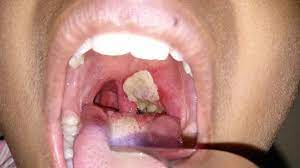Like a wild fire, the latest outbreak of Diphtheria in Nigeria has spread to 105 Local Government Areas across the country, killing 453 children as of 24th of September, 2023.
Diphtheria, caused by a toxin produced by the bacteria Corynebacterium diphtheriae, is a vaccine-preventable disease covered by one of the vaccines provided routinely through Nigeria’s childhood immunization schedule.
Confirming the situation in its latest update on the Federal Government’s response to the outbreak, the Nigeria Centre for Disease Control and Prevention, NCDC, and National Primary Health Care Development Agency, NPHCDA, explained that 5,299 [73.6 per cent]) of the confirmed cases occurred among children aged 1 – 14 years with those aged 5-14 years bearing most of the brunt of the disease.
The Agencies in the joint statement, explained that as of September 24th, 2023, there have been 11,587 reported suspected cases out of which 7,202 were confirmed cases from 105 Local Government Areas, LGAs, in 18 States including the FCT.
They noted that a total of 6,185 of the confirmed cases were recorded in Kano while other States with cases include; Yobe (640), Katsina (213), Borno (95), Kaduna (16), Jigawa (14), Bauchi (8), Lagos (8), FCT (5), Gombe (5), Osun (3), Sokoto (3), Niger (2), Cross River (1), Enugu (1), Imo (1), Nasarawa (1) and Zamfara (1). The majority (5,299 [73.6%]) of the confirmed cases occurred among children aged 1 – 14 years with those aged 5-14 years bearing most of the brunt of the disease.
“So far, a total of 453 deaths have occurred in confirmed cases giving a case fatality rate (CFR) of 6.3 per cent,” they noted.
They further noted that with the escalation of the outbreak and findings that 80 per cent of confirmed cases in the ongoing outbreak were unvaccinated, the Coordinating Minister of Health, Professor Muhammad Ali Pate, has set a national emergency task team co-chaired by the Executive Director of NPHCDA and the Director General of NCDC for higher level coordination of outbreak response efforts.
The team will also ensure optimal collaboration of all relevant health stakeholders in the fight.
Other prominent members of the task force include: Director of Public Health-FMOH, representatives from the Federal Ministry of Information, the World Health Organization, WHO, the United Nations Children’s Fund, UNICEF, USCDC, USAID, GAVI, the Vaccine Alliance, other non-governmental organizations and development partners.
They further noted that a historical gap in vaccination coverage was the driver of the outbreak given the most affected age group of 5–14year-olds and results of the nationwide diphtheria immunity survey that shows only 42 per cent of children under 15 years old are fully protected from diphtheria.
The statement further stated: “The Federal Ministry of Health & Social Welfare (FMOH&SW) is aware of the mounting concern regarding the recent Diphtheria outbreak across several states in Nigeria. Since the confirmation of the re-emergence of diphtheria in Nigeria in December 2022, the Federal Government of Nigeria through the NCDC and NPHCDA have continued to respond to diphtheria outbreaks across different states in the country.
“Since the confirmation of an outbreak, the FMOH&SW through her agencies has been coordinating surveillance and response activities across the country. These include response coordination, surveillance, laboratory investigation, vaccination, case management, and risk communication activities.
“For the first time for any diphtheria outbreak, the FMOH&SW through NCDC and with WHO support, procured diphtheria antitoxin (DAT) and more recently intravenous erythromycin and distributed them to the affected states.
“With support from partners and in collaboration with the State Ministry of Health, Diphtheria Treatment Centers/Wards have been established in affected States.”
They have also intensified routine diphtheria immunization and reactive vaccination campaigns in 33 local government areas (LGAs) across five (5) states – Bauchi, Katsina, Yobe, Kano, and Kaduna by the NPHCDA among others.
The agencies advised that to reduce the risk of diphtheria, parents should ensure that their children are fully vaccinated against diphtheria with the 3 doses of diphtheria antitoxin-containing pentavalent vaccine given as part of Nigeria’s childhood immunization schedule.
They also stated that healthcare workers should maintain a high index of suspicion for diphtheria and practice standard infection prevention and control precautions while handling all patients in their care.
“All healthcare workers (doctors, nurses, laboratory scientists, support staff etc.) with a high level of exposure to cases of diphtheria should be vaccinated against diphtheria.
“Individuals with signs and symptoms suggestive of diphtheria should promptly present to a healthcare facility or designated diphtheria treatment centers and where possible they and/or healthcare workers should notify their LGA, State Disease Surveillance Officer (DSNO), their State Ministry of Health helpline, or the NCDC through our toll-free line on 6232.
“Close contact with a confirmed case of diphtheria should be closely monitored and managed according to guidelines.
“The most effective protection against diphtheria is vaccination with the Pentavalent or TD vaccine. The Federal Government of Nigeria provides free, safe, and effective vaccines at all Primary Healthcare Centers nationwide.
“We invite the public to take advantage of the ongoing vaccination occurring in all states. Parents are kindly advised to take their children aged 0 – 14 years to the nearest Government health facility to get vaccinated in accordance with the routine immunization schedule and ongoing reactive vaccination campaign in the affected Local Government Areas (LGAs) as applicable. Vaccination saves lives,” they added.



